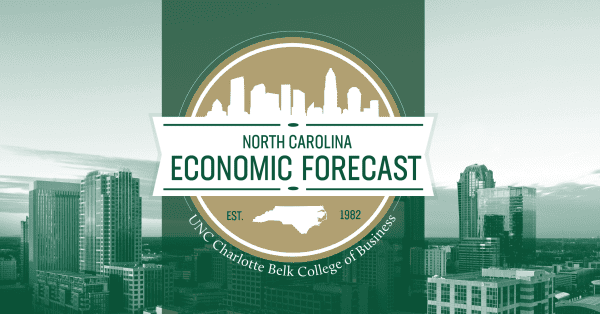Forecast: Inflation a Growing Risk for North Carolina’s Economy in 2022

Growing concerns about inflation and the emerging omicron variant are “the two big known unknowns” heading into 2022, according to John Connaughton, director of the North Carolina Economic Forecast.
“We know that inflation has been here for the past six months,” said Connaughton, professor of financial economics at UNC Charlotte’s Belk College of Business. “The Fed has indicated it’s taking a different tack in 2022 but will that be enough to bring inflation down without creating a recession? That’s the big question for 2022. This is a very delicate balance.”
Connaughton added that it’s far too early to predict the impact omicron will have on the state’s recovery.
The Belk College released the “Fourth Quarter North Carolina Economic Forecast Report” on Thursday, Dec. 9.
Gross Domestic Product Analysis
In 2022, North Carolina economic growth will begin to return to pre-COVID levels, representing a second full year of growth since the pandemic.
For 2022, 14 of the state’s 15 economic sectors are expected to experience output increases, with the hospitality and leisure services projected to see the strongest growth at 9.2%.
Other top growth sectors for 2022 are:
-
Information: 4.7%
-
Other Services: 4.2%
-
Educational and Health Services: 3.8%
Only the state’s agricultural sector is expected to see a decline, at 0.1%.
Employment
The jobs recovery continues to be unevenly distributed among the state’s economic sectors, Connaughton said.
“The real impact of the COVID recession has been on employment,” Connaughton said. “As of October 2021, the state’s level of establishment employment is still just over 70,000 lower than the February 2020 high water mark of 4,626,600 jobs.”
The hospitality and leisure sector establishment employment level is 49,000 jobs lower than the February 2020 level, he said, accounting for two-thirds of the overall lower North Carolina jobs level that still exists through October.
According to the report, all 14 of the state’s nonagricultural economic sectors are expected to experience employment increases in 2022.
North Carolina employment is expected to reach 4,712,900 by December 2022, an increase of 2.7% over December 2021. The state is expected to add 124,400 net jobs next year.
These sectors are expected to have the strongest employment increases in 2022:
-
Other Services: 7.4%
-
Information: 6.1%
-
Hospitality and Leisure Services: 5.0%
-
Construction: 4.9%
The North Carolina unemployment rate, which started 2021 at 5.9%, had fallen consistently to 4.1% by October. The state’s unemployment rate is expected to decline slightly through 2022 and end the year at 4.0%.
2021: A Look Back
This year started off strong, Connaughton said. However, the Delta variant spike in August and September slowed the economy as customers and businesses adapted to the increase in cases and deaths.
According to the report, 11 of the state’s 15 economic sectors are expected to experience output increases during 2021, a change from the September report. The sectors with the strongest expected real increases are:
-
Hospitality and Leisure Services: 26.7%
-
Information: 15.3%
-
Business and Professionals Services: 10.7%
-
Health Services: 9.0%
Four sectors are expected to experience output declines during 2021:
-
Mining: 6.8% decrease
-
Agriculture: 6.3% decrease
-
Transportation, Warehousing and Utilities: 3.5% decrease
-
Government: 1.3% decrease
The North Carolina Economic Forecast, which debuted in 1982, is published quarterly by UNC Charlotte’s Belk College of Business. The full report and a recording of the presentation will be available at belkcollege.charlotte.edu/forecast.
The First Quarter North Carolina Economic Forecast Report will be released on March 22.
Green and Gold Drive Business
Established in 1970, UNC Charlotte’s Belk College of Business is one of the Carolinas’ largest business schools, with more than 5,100 students, more than 100 full-time faculty, and an alumni network of more than 34,000. Accredited by AACSB International, the college is committed to building strong partnerships in the greater Charlotte region and beyond as North Carolina’s urban research business school. Learn more about how the Belk College is driving business at belkcollege.charlotte.edu, and on LinkedIn, Facebook, Twitter and Instagram.